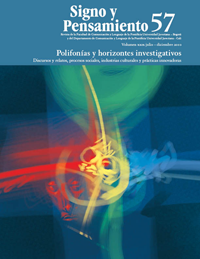Abstract
This article examines the implications of contemporary societies relationship with technology. Our reflection focus on the impact video games have on the relation time-subjectivity-knowledge, through narrative transformations and their subsequent alterations of cultural and social sensibilities. Likewise, we put forward the idea that video games are shaped and formed as a result of science fiction’s proposals, all considered as modernity’s meta-narrative via the consolidation of the cyborg’s metaphor as a an altered and reinvented body.
Bioy Casares, A. (1984), La invención de Morel, Madrid, Cátedra.
Bogost, I. (2007), Persuasive Games. The Expressive Power of Videogames, Massachusetts, Massachusetts Institute of Technology.
Caillois, R. (1997), Los juegos y los hombres. La máscara y el vértigo, México, Fondo de Cultura Económica.
Darley, A. (2002), Cultura visual digital. Espectáculo y nuevos géneros en los medios de comunicación, Buenos Aires, Paidós.
Duvignaud, J. (1997), El juego del juego, Bogotá, Fondo de Cultura Económica. Esnaola, G. A. (2006), Claves culturales en la construcción del conocimiento. ¿Qué enseñan los videojuegos?, Buenos Aires, Alfagrama.
Featherstone, M; Hepworth, M., y Turner, B. (2001), The Body. Social Process and Cultural Theory, Londres, Sage Publications.
Featherstone, M. y Burrows, R. (2000), Cyberspace, Cyberbodies and Cyberpunk. Cultures of Technological Embodiment, North Yorkshire, Sage Publications.
Gee, J. P. (2007), What Videogames Have to Teach Us About Learning and Literacy, Nueva York, Palgrave Macmillan.
Giddings, S. (2007), “Dionysiac Machines. Videogames and the Triumph of the Simulacra”, en Convergence: The International Journal of Research into New Media Technologies, vol. 13, núm. 4, pp. 417-431.
Gros, B. (2000, junio), “La dimension socioeducativa de los videojuegos”, en Edutec: Revista electrónica de tecnología educativa, núm. 12.
Gubern, R. (2000), El eros electrónico, Madrid, Taurus.
Haraway, D. (1984), “El manifiesto cyborg. Ciencia, tecnología y feminismo socialista en el siglo xx” [en línea], disponible en http:// manifiestocyborg.blogspot.com/, recuperado: 20 de febrero de 2010.
Huergo, J. (2000), “Comunicación/educación: itinerarios transversales”, en Valderrama, C. (ed.), Comunicación-educación. Coordenadas, abordajes y travesías, Bogotá, Universidad Central, Siglo del Hombre Editores.
Huizinga, J. (2007), Homo ludens, Barcelona, Alianza Editorial.
Landow, P. G. (1995), Hipertexto. La convergencia de la teoría crítica contemporánea y la tecnología, Barcelona, Paidós.
Le Bretón, D. (2007), Adiós al cuerpo. Una teoría del cuerpo en el extremo contemporáneo, Mexico, La Cifra.
McLuhan, M. y Quentin, F. (1967), El medio es el masaje, Nueva York, Bantam Books.
Martín-Barbero, J. (2002), “Jóvenes: des-orden cultural y palimpsestos de identidad”, en Cubides, C. y Humberto, J. (ed.), Viviendo a toda jóvenes, territorios culturales y nuevas sensibilidades, Bogotá, Universidad Central, Departamento de Investigaciones, Siglo del Hombre.
— (2003), La educación desde la comunicación, Bogotá, Norma. Mbembe, A. (2001), On the Postcolony, Berkeley, University of California Press.
Moreno, I. (2002), Musas y nuevas tecnologías. El relato hipermedia, Paidós, Barcelona.
Piscitelli, A. (2002), Metacultura. El eclipse de los medios masivos en la era de Internet, Buenos Aires, La Crujía.
Quiroz, M. T. (2003), Aprendizaje y comunicación en el siglo xxi, Bogotá, Norma.
Rueda Ortiz, R. (2003), Hipertexto: representación y aprendizaje, Bogotá, Tecne.
Rueda Ortiz, R. y Quintana Ramírez, A. (2007), “Ellos vienen con el chip incorporado: aproximación a la cultura informática escolar”, Bogotá, Instituto para la investigación Educativa y el Desarrollo Pedagógico (idep), Universidad Distrital Francisco José de Caldas, Universidad Central, Departamento de Investigaciones.
Schultz, M. (2006), Filosofía y producciones digitales, Buenos Aires, Alfagrama Ediciones.
Stone, A. R. (1996), The War of Desire and Technology at the Close of the Mechanical Age, Massachusetts, Massachusetts Institute of Technology.
Turkle, S. (1995), Life on the Screen. Identity on the Age of Internet, Nueva York, Simon & Schuster.
Venn, C. (2000), Occidentalism. Modernity and Subjectivity, Londres, Sage.
This journal is registered under a Creative Commons Attribution 4.0 International Public License. Thus, this work may be reproduced, distributed, and publicly shared in digital format, as long as the names of the authors and Pontificia Universidad Javeriana are acknowledged. Others are allowed to quote, adapt, transform, auto-archive, republish, and create based on this material, for any purpose (even commercial ones), provided the authorship is duly acknowledged, a link to the original work is provided, and it is specified if changes have been made. Pontificia Universidad Javeriana does not hold the rights of published works and the authors are solely responsible for the contents of their works; they keep the moral, intellectual, privacy, and publicity rights.
Approving the intervention of the work (review, copy-editing, translation, layout) and the following outreach, are granted through an use license and not through an assignment of rights. This means the journal and Pontificia Universidad Javeriana cannot be held responsible for any ethical malpractice by the authors. As a consequence of the protection granted by the use license, the journal is not required to publish recantations or modify information already published, unless the errata stems from the editorial management process. Publishing contents in this journal does not generate royalties for contributors.


